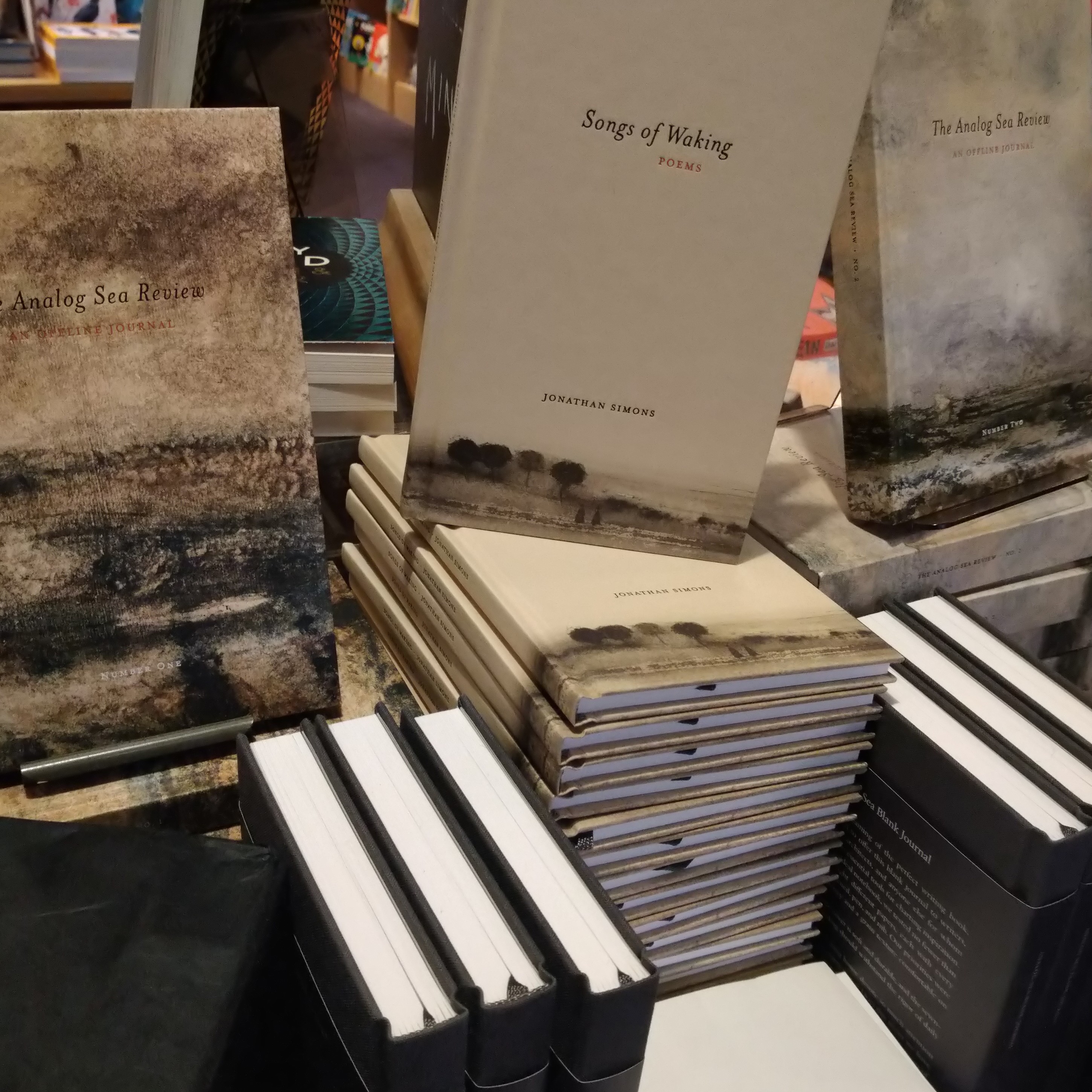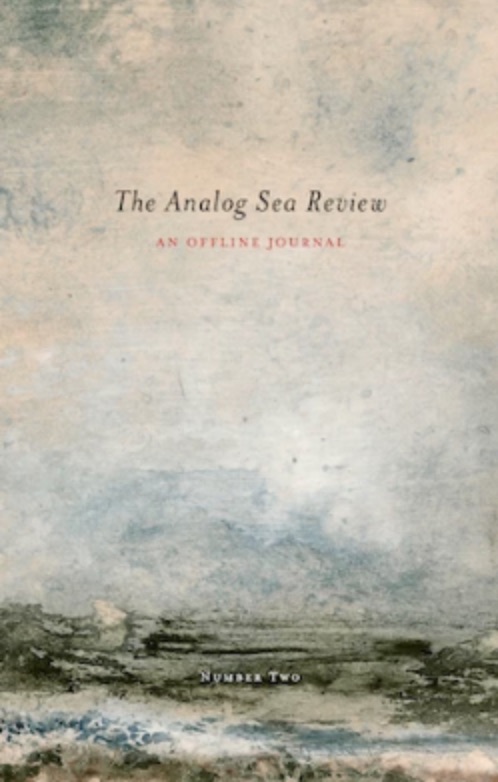Indie Groundbreaking Publisher
Analog Sea
An Offline Publisher
When it comes to independent publishers, there’s “indie” and then there’s “way indie.” Self-described “offline” publisher, Analog Sea, is one of the “way indie” publishers that is making a cultural revolutionary statement with its very existence. Founded several years ago, “as a rebuttal to the increasing digitization of the arts and letters and the belief that books should be sold by human booksellers rather than online algorithms,” Analog Sea publishes with an attitude that books should look, feel, and read like the sacred objects they are – or at least they once were. (Like much in our hyper-consumer, “bingeing” society, books have become another commodity being cranked out like widgets. Amazon is currently publishing Kindle ebooks at a pace of about 70 titles per hour.)
 Not so with a book from Analog Sea. These are books that you feel as much as read. Just to hold the book in your hands feels right; the weight of the paper stock; the texture of the letterpress type; the classic look of the fonts and illustrations, all leading to a comforting and enriching reading experience. These books are meant to enjoy at a relaxed pace – no hurry to get through them. Slow down, comprehend, and connect with humanity.
Not so with a book from Analog Sea. These are books that you feel as much as read. Just to hold the book in your hands feels right; the weight of the paper stock; the texture of the letterpress type; the classic look of the fonts and illustrations, all leading to a comforting and enriching reading experience. These books are meant to enjoy at a relaxed pace – no hurry to get through them. Slow down, comprehend, and connect with humanity.Analog Sea aims to support what it calls offline culture: “We are interested in what poets, novelists, essayists, and visual artists create in solitude, that vital stretch of time when distraction fades and deep wells of thinking and feeling emerge.” The publisher has no Internet presence, choosing instead to grow its readership via word of mouth and stockists. Instead of using social media, it communicates with its subscribers via a printed biannual free publication, The Analog Sea Bulletin, which is posted to readers’ homes.
It also sends out free special mailings––most recently, as a response to the pandemic, an elegantly typeset edition of an essay, “Life Beyond the Machine,” written by its founding editor, Jonathan Simons, along with a pocket-sized blank journal for “notes from solitude.” The gift to readers, wrote Simons, marked the hope that “in the long run, the mesmerizing conveniences of the virtual fail to prevail over the precious sensuality of the real.”
In “Life Beyond the Machine,” Simons laments how the current pandemic has forced us away from each other and into our screens, “a world without bodies, without bookshops, libraries, cinemas, cafés, this world without skin and eye contact, texture, smell, or taste, this virtual reality teeming with countless photos of food, but nothing anywhere to eat. We finally have the whole world in the palm of our hand but fail to realize that it’s not the real world at all, but merely a flat, glossy replica.”
Simons quotes the Spanish philosopher José Ortega y Gasset writing in the weeks leading up to World War II: “Almost everyone is beside himself, agitated, and with agitation man loses is most essential attribute – the possibility to contemplate, to retreat into himself so that he comes to terms with himself and defines what he believes, what he truly values, and what he truly detests.”
Wondering if in “our age of anxiety” that digital hy perstimulation has taken control of our lives, Simons quotes Josef Pieper who wrote in 1952, “Leisure, it must be remembered, is not a Sunday afternoon idyll, but the preserve of freedom, of education and culture, and of that undiminished humanity which views the world as a whole.”
perstimulation has taken control of our lives, Simons quotes Josef Pieper who wrote in 1952, “Leisure, it must be remembered, is not a Sunday afternoon idyll, but the preserve of freedom, of education and culture, and of that undiminished humanity which views the world as a whole.”
 perstimulation has taken control of our lives, Simons quotes Josef Pieper who wrote in 1952, “Leisure, it must be remembered, is not a Sunday afternoon idyll, but the preserve of freedom, of education and culture, and of that undiminished humanity which views the world as a whole.”
perstimulation has taken control of our lives, Simons quotes Josef Pieper who wrote in 1952, “Leisure, it must be remembered, is not a Sunday afternoon idyll, but the preserve of freedom, of education and culture, and of that undiminished humanity which views the world as a whole.” On our rampant consumerism, he quotes Byung-Chul Han: “Consumer goods do not permit a contemplative lingering. They are used up as quickly as possible in order to create space for new products and needs. Contemplative lingering presupposes things which endure. But the compulsion to consume does away with duration.”
In his conclusion, Simons wonders if after the pandemic we will have re-learned the value of human contact, or “whether we will have fallen even harder for the convenience of staying home and having life delivered to us in cardboard boxes and through lifeless plates of glass.”
“Our new digital overlords, triumphant and emboldened, will surely double down on their promise to engineer a world without boredom, without friction, without bodies. But will we have the interiority and resolve to choose leisure?”
Take that, Jeff Bezos!
 With offices in Austin, Texas and Freiburg, Germany, Analog Sea lovingly distributes its small list of ecologically produced hardcover titles to an extensive network of stockists throughout the world. It also publishes an acclaimed biannual literary journal, The Analog Sea Review, the second issue of which was awarded an Independent Publisher Book Awards 2020 silver medal for anthologies and was a Next Generation Indie Book Awards finalist for Best Overall Design (non-fiction).
With offices in Austin, Texas and Freiburg, Germany, Analog Sea lovingly distributes its small list of ecologically produced hardcover titles to an extensive network of stockists throughout the world. It also publishes an acclaimed biannual literary journal, The Analog Sea Review, the second issue of which was awarded an Independent Publisher Book Awards 2020 silver medal for anthologies and was a Next Generation Indie Book Awards finalist for Best Overall Design (non-fiction). * * * * *
To receive a copy of Jonathan’s essay and a free notebook, along with the Analog Sea Bulletin and a list of Analog Sea stockists, send a letter or postcard to Analog Sea, PO Box 11670, Austin, TX 78711.

